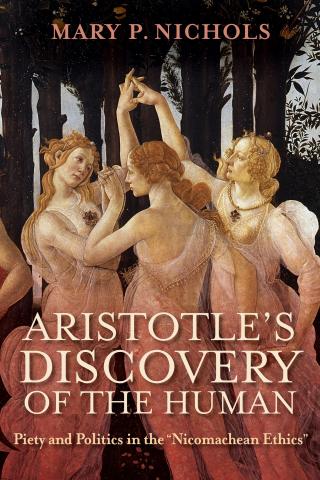Notre Dame publishes Nichols on Aristotle’s ETHICS
Mary P. Nichol's Aristotle's Discovery of the Human: Piety and Politics in the "Nicomachean Ethics, was published last summer (2023) by Notre Dame University Press. The book, which complements her earlier commentary on Aristotle’s Politics, Citizens and Statesmen (1992), represents the culmination of her teaching the Ethics for over forty years at Northern Illinois, Catholic, Fordham, and most recently at Baylor, where she is now professor emerita in the department of political science. Her teaching the Ethics has inspired numerous graduate students over the years, who continued to explore Aristotle’s Ethics in their dissertations, articles, and books. According to Harvey C. Mansfield, of Harvard’s Department of Government, “Notable for clarity, good sense, and insight, Mary Nichols’s lovely book is a delight and a treasure.”
As Dan Mahoney, Professor Emeritus at Assumption University, explains in the forthcoming issue of the Claremont Review of Books, Nichols “restores dignity and grace to the understanding of Aristotle's philosophizing about human affairs. Like Aristotle himself, Nichols allows contemplative reflection, high prudence, and moral virtue to coexist in a spirit of friendship without conflating or collapsing them. In her own apt words, she examines ‘how Aristotle deepens our view of human virtue by presenting human strength in light of humanity's spirited resistance to bestiality,’ what is beneath us and corrupts our souls, ‘and in light of humanity's awareness of a divinity beyond itself" (divine wisdom and heroic virtue that are in important respects ‘beyond us’). Philosophy, as Nichols understands it, ennobles and is ennobled by friendship, prudence, and moral virtue, and a wisdom that humanizes because it is truly open to that which is above us.”
The Three Graces from Botticelli’s “Primavera,” depicted on the cover, are associated in Greek myth with joy, celebration, and beauty. In his discussion of justice, Aristotle refers to their shrines, which are erected in prominent places to remind human beings to benefit others in return, and even to initiate acts of beneficence. Just as Aristotle’s Graces remind citizens of what supplements and enriches legal and political arrangements, Nichols argues, Aristotle’s Ethics as a whole reminds us of the virtues that can supplement and enrich liberal politics.
